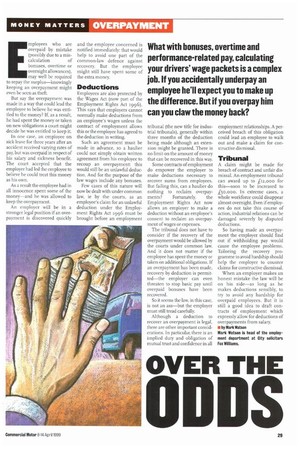E mployees who are overpaid by mistake (possibly due to a mis
Page 31

If you've noticed an error in this article please click here to report it so we can fix it.
calculation of bonuses, overtime or overnight allowances), may well be required to repay the surplus—knowingly keeping an overpayment might even be seen as theft.
But say the overpayment was made in a way that could lead the employee to believe he was entitled to the money? If, as a result, he had spent the money or taken on new obligations a court might decide he was entitled to keep it.
In one case, an employee on sick leave for three years after an accident received varying rates of pay, but was overpaid in respect of his salary and sickness benefit. The court accepted that the employer had led the employee to believe he could treat this money as his own.
As a result the employee had in all innocence spent some of the money—and he was allowed to keep the overpayment.
An employer will be in a stronger legal position if an overpayment is discovered quickly and the employee concerned is notified immediately: that would help to avoid one part of the common-law defence against recovery. But the employee might still have spent some of the extra money.
Deductions
Employees are also protected by the Wages Act (now part of the Employment Rights Act 1996). This says that employers cannot normally make deductions from an employee's wages unless the contract of employment allows this or the employee has agreed to the deduction in writing.
Such an agreement must be made in advance, so a haulier could not simply obtain written agreement from his employee to recoup an overpayment: this would still be an unlawful deduction. And for the purpose of the law wages include any bonuses.
Few cases of this nature will now be dealt with under common law, ie by the courts, as an employee's claim for an unlawful deduction under the Employment Rights Act 1996 must be brought before an employment tribunal (the new title for industrial tribunals), generally within three months of the deduction being made although an extension might be granted. There is no limit on the amount of money that can be recovered in this way.
Some contracts of employment do empower the employer to make deductions necessary to recover sums from employees. But failing this, can a haulier do nothing to reclaim overpay ments? Fortunately, the Employment Rights Act now allows an employer to make a deduction without an employee's consent to redaim an overpayment of wages or expenses.
The tribunal does not have to consider if the recovery of the overpayment would be allowed by the courts under common law And it does not matter if the employee has spent the money or taken on additional obligations. If an overpayment has been made, recovery by deduction is permitted—the employer can even threaten to stop basic pay until overpaid bonuses have been recovered.
So it seems the law, in this case, is not an ass—but the employer must still tread carefully.
Although a deduction to recover an overpayment is legal, there are other important considerations. In particular, there is an implied duty and obligation of mutual trust and confidence in all
employment relationships. A perceived breach of this obligation could lead an employee to walk out and make a claim for constructive dismissal.
Tribunal
A claim might be made for breach of contract and unfair dismissal. An employment tribunal can award up to 112,000 for this—soon to be increased to £50,000. In extreme cases, a whole workforce could disappear almost overnight. Even if employees do not take this course of action, industrial relations can be damaged severely by disputed deductions.
So having made an overpayment the employer should find out if withholding pay would cause the employee problems. Tailoring the recovery programme to avoid hardship should help the employer to counter claims for constructive dismissal.
When an employer makes an honest mistake the law will be on his side—as long as he makes deductions sensibly, to try to avoid any hardship for overpaid employees. But it is still a good idea to draft contracts of employment which expressly allow for deductions of overpayments from salary.
• by Mark Watson Mark Watson is head of the employment department at City solicitors Fox Williams.




































































































